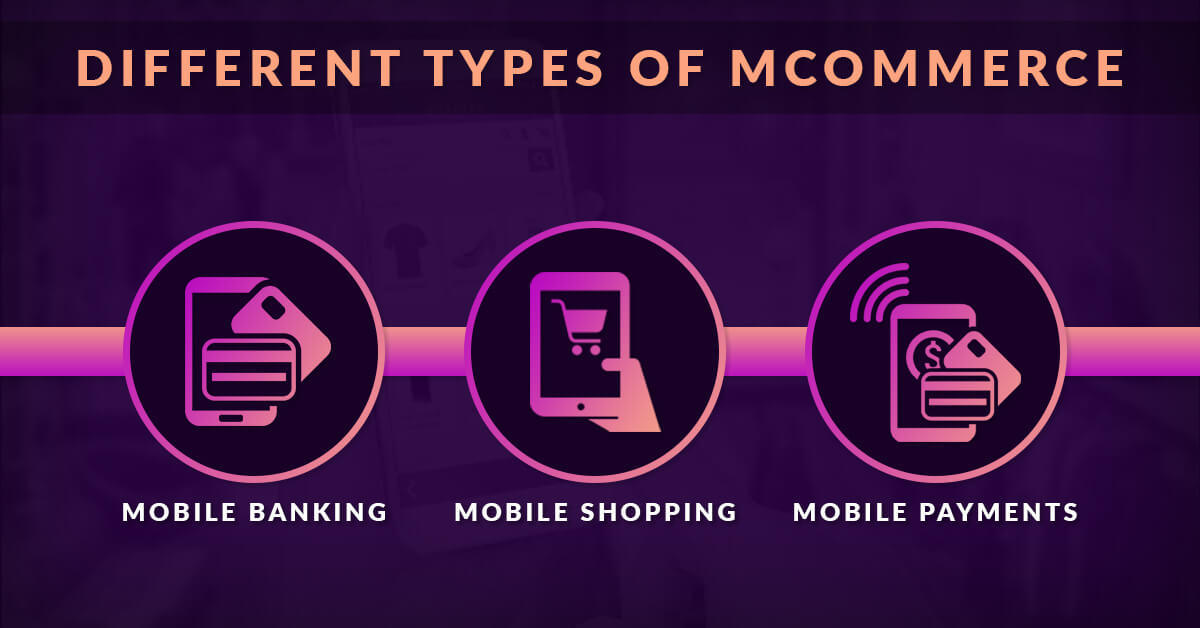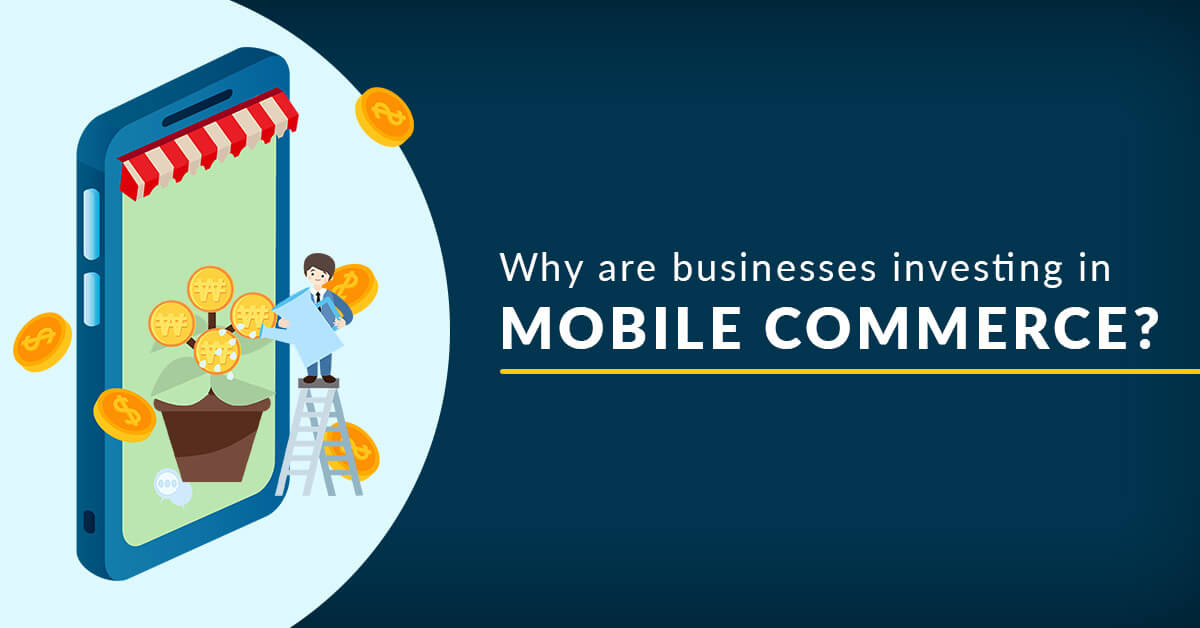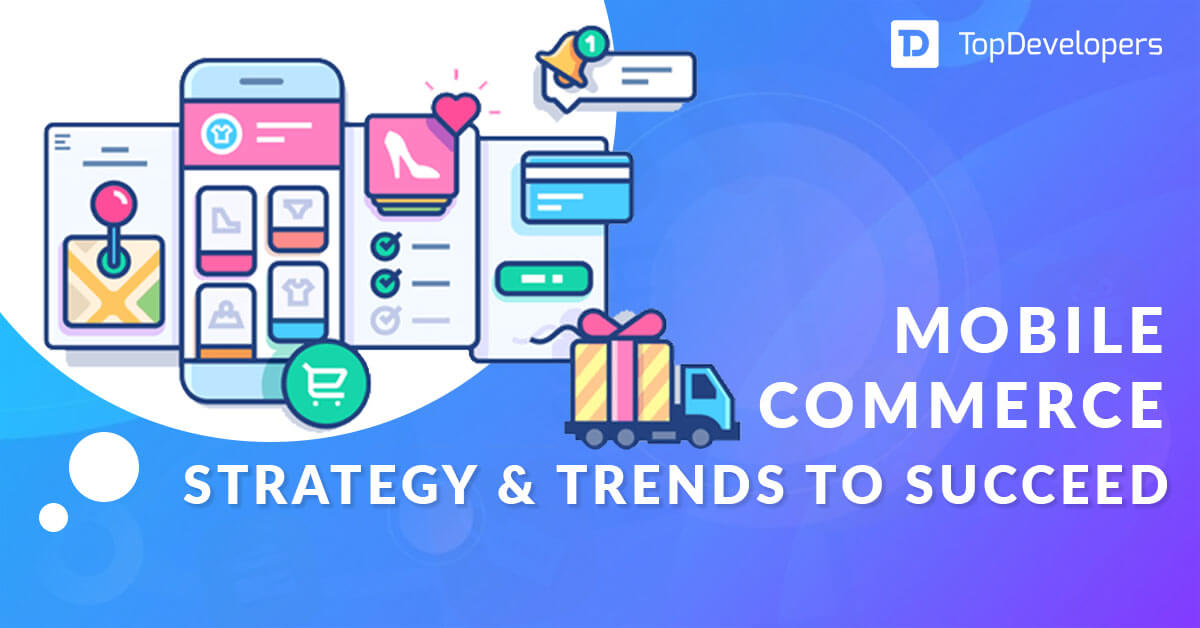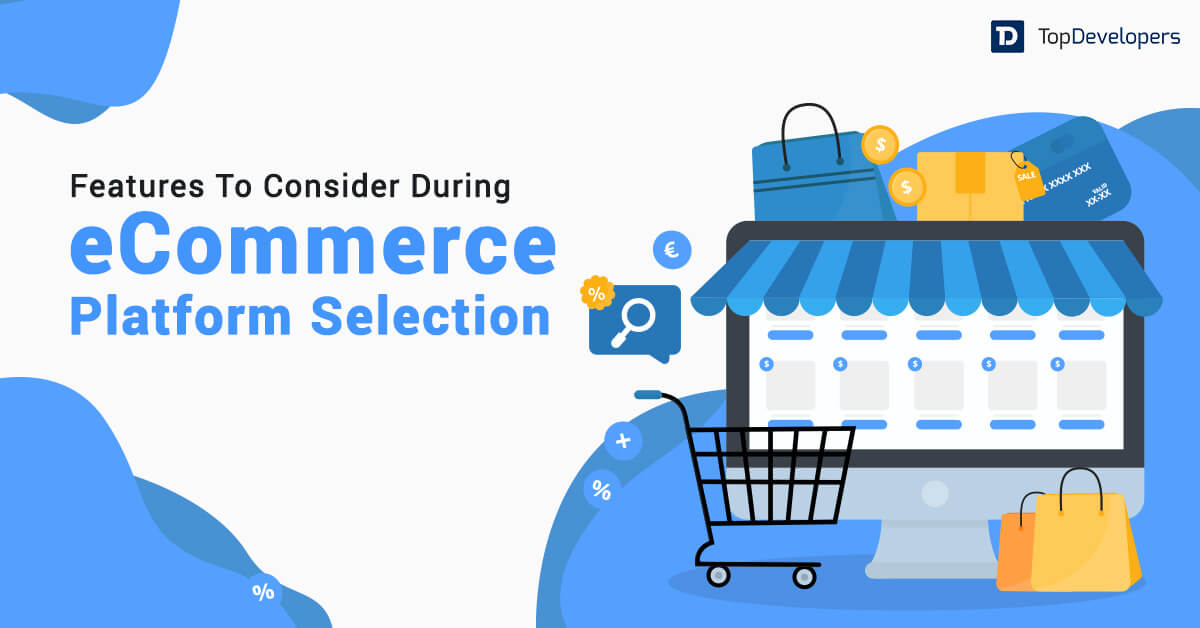
Mobile commerce has gained immense traction in the past several years as it offers many advantages compared to traditional eCommerce. One of the main benefits is that mCommerce allows enterprises to tap more customers as most customers today use mobile devices and not desktop computers. According to Statista, the number of smartphone users is likely to rise from 3.8 billion in 2021 to a whopping 7.7 billion by 2028.
Another advantage is that you can contact mCommerce app development company to further customize your app. Customized mobile commerce app enhances customer experience of specific kinds because you would like to provide a more convenient and tailored shopping experience. From products or items listing to secure payment gateway and tracking the package, everything is easily performed. Ultimately, customers can browse through hundreds of products, compare prices, and buy products anytime from anywhere.
An apt mobile commerce strategy can help to achieve this and more. So, let’s understand about it in detail.
Table of Contents
- Different types of Mobile Commerce
- Why are businesses investing in Mobile Commerce?
- Building a Successful Mobile Commerce Strategy
- Prioritize app development
- Don’t forget SEO
- Use push notifications creatively
- Simplify checkout process
- Regular updates for the mobile commerce app
- Best User Interface (UI)
- Instant transaction
- Chatbot
- Craft the user journey
- Go for your ideal CMS
- Design with mobile as the core focus
- Boost your customer service
- Easy and simple checkout process
- Use push notifications
- Dive into mobile marketing
- Create an in-app loyalty program
- Examples of successful mobile commerce strategies
Different types of Mobile Commerce
The mobile commerce world is very diverse. Within this digital realm, there are three different types of mobile transactions happening:
- Mobile Banking
- Mobile Shopping
- Mobile Payments
Mobile Banking
It includes transferring money from one bank account to another using a mobile device. In addition, through mobile banking, you can do the required banking work through a mobile device.
Mobile Shopping
The shopping that you do through your mobile device like ordering a book online or buying new clothes comes under mobile shopping.
Mobile Payments
Doing payments through a mobile device by using different apps falls under the mobile payments category. Be it paying for your grocery bill after dinner via Apple/Google Pay, Cred, or PayTM, everything falls under the umbrella of mobile payment.
Why are businesses investing in Mobile Commerce?
Below are some of the top reasons why companies are investing in mobile commerce on a very large scale:
Better internet presence
In today’s digitally driven world, no business can afford to have a limited internet presence. Mobile commerce helps set up a good online shop, which will increase the visibility of your product and its overall user base. Moreover, you can effectively use the right keywords for the online content to gain more organic traffic.
The horizon of online purchases is rising
Online purchases have risen to unprecedented levels and now with the emergence of mobile commerce, it is set to go even higher. Online shopping is easy and looking at the present pandemic situation, it is best to have an online shop for the betterment of your business
Knowing what your customers want
By understanding the buying pattern, you can understand and track your customers’ needs with mobile commerce. The mcommerce store has a variety of tools that will keep you at par with the evolving buying habits of your customers.
Cost-effective
It’s no-brainer that setting up an online shop is far more economical than having a physical store. Moreover, running an eCommerce store is a viable option for small businesses as they don’t have to deal with the overhead costs.
Building a Successful Mobile Commerce Strategy
The future of mobile commerce holds a brilliant ideology for businesses and startups. It is and will be transforming shopping experiences to another level. So, you must create a mobile commerce strategy that works best for you.
Below are some important steps if you want to build a strong mobile commerce strategy that will help you coping up with the mobile commerce trends in the future:
Prioritize app development
The whole chunk of potential customers is moving to handheld devices. With billions of people using smartphones with internet connections worldwide, prioritizing app development should top the list in mobile commerce strategy. For prioritizing the making of an app, it is recommended that you go through the mobile commerce app development guide to gain basic knowledge about the process.
Don’t forget SEO
Search Engine Optimization still holds its importance in mobile commerce app marketing. Here, the SEO would be specific to mobile apps such as app store optimization. Digital marketing agencies can help you craft perfect copies and placements for mobile commerce SEO that can help you rank your product on the Internet. Special keywords and key phrases for eCommerce can also be included to gauge extra miles in ranking.
Use push notifications creatively
Push notifications can do wonders as a mobile commerce strategy; they can help you leverage the best benefits to reach every single customer that you target. Nonetheless, boring text messages as push notifications would have reverse effects and would damage your brand’s reputation. For mobile commerce enhancement, using push notifications creatively such as with attractive graphics or visuals would be a preferred way.
Simplify checkout process
Most customers of mobile commerce would be quite conscious about payment methods. In fact, for any business, payment methods and types would be a deciding factor for a visitor to buy products or services. In other words, simplified yet secured payment gateway integration should be one of the priorities in the list of mobile commerce strategies. Pay attention to the UI of the payment option, offering multiple payment gateways, and simplistic navigation that executes the checkout process is the best thing you can have.
Regular updates for the mobile commerce app
Updates help keep a digital product up-to-date and usable in varied conditions. They also help eCommerce companies to add, edit, and delete specific information or data from the mCommerce app; plus bug fixing or including a new feature is possible through updates. Users’ feedback can be taken positively to improve mobile commerce applications and therefore regular updates are essential. According to marketing experts, periodic app updates also make users remember about the application and thus in a way, the mobile commerce companies can stay in touch with their potential customers.
Best User Interface (UI)
Even giants such as Meta, Google, and Microsoft put billions of dollars into UI/UX research to enhance their products and retain a huge customer base. It is all about enticing and catching everybody’s attention through intuitive and engaging UI. Following the guidelines for the best UI would assure you that not only does a mobile commerce app engage users but also stays on their mobile devices for a longer time. This shall also save your app from being uninstalled (shortly after downloading and installing) which is quite a common concern for startups and large eCommerce companies as well.
Instant transaction
Speed is the key to today’s business success. Swift and secure transactions would build trust in your mobile commerce application and so your online store. Minimum clicks by users to reach their goal should be also one of the mobile commerce strategies for your business because more taps and more redirections would confuse users and there are chances that they may leave the mobile commerce platform. Instant selection of required products and instant transactions through minimum taps (you can also offer multiple payment gateways such as eWallet, Bank or Wire Transfer, and so on) would improve user experience and trust in your app.
Chatbot
in recent years, Chatbot has encroached on almost every industry sector with its Artificial Intelligence. Myriad benefits of AI-enabled chatbots for premium and instant customer services have made this tool the must-have feature and facility in mobile commerce apps for online stores. Instant responses to customers about products, services, shipments, discounts, and order tracking can make your app lovable by your users and thus it should be one of the important mCommerce strategies.
Craft the user journey
Your users’ engaging experience starts from when they visit your website to when they finally purchase. To elevate their experience and give them a great user journey, learn how an ideal marketplace business model should be and how it should support the users at every step of the purchase process. The key is to identify the touch-points on your website when your user interacts the most, whether while visiting it or post-purchase. After all, if your process to the purchase isn’t smooth enough, your user won’t spend a second to be there.
Go for your ideal CMS
Another important aspect of building a mobile commerce strategy is choosing the right content management system(CMS). Since your business will be focused on targeting customers with mobile devices such as smartphones, tablets, it’s best to invest in a CMS that supports mobile responsiveness. Also, it’s common for mobile users to expect low page load times since they want quick and easy access. So, your CMS must be flexible enough and known for its optimization and performance.
Design with mobile as the core focus
Did you know that in the US, 54.2 million people used mobile phones along with watching TV in the year 2018. This clearly depicts how common it is for us humans to multitask with mobiles in our hands. So, when you are creating a strategy for your mobile commerce, be sure that you consider all these points and integrate intuitive designs to capture the attention of the users. The best way to achieve this is to prioritize mobile-based features such as easy-to-tap buttons, readable fonts, and drop-down menus.
Boost your customer service
Customer satisfaction is one of the major goals of any business or startup. So, after your customer has made a purchase, it’s your job to make communication easier on your mobile ecommerce platform. This mobile commerce strategy helps your users to enquire about any concern immediately through the comfort of their mobile device.
Here, SMS or text message for customer care significantly generates mobile client engagement. Customer care service allows mobile users to talk with a customer care representative as easily as anybody else and resolve problems wherever and whenever needed.
Easy and simple checkout process
One of the primary advantages of implementing a solid mobile commerce strategy for all users is convenience. This is why mobile commerce is so popular because it really helps cut down the time of payment from minutes to seconds without any long processes to indulge in.
Fast payment processing benefits more than just the client. Customers have less time to second-guess their choices when they pay quickly. Payment systems like Paytm, CRED, ApplePay, and Google Pay help streamline the checkout process, as seen in various types of mCommerce while ensuring payment security.
Use push notifications
Being more flexible and quicker than your competitors in the fast-paced world of mCommerce nowadays is essential to retaining clients. You can greatly improve your conversion and click-through rates by using push notifications.
Most users engage with push notifications within an hour of getting them. Push notifications strategy is your greatest ally if you want users to return to your mCommerce app. They may be an excellent approach to interact with clients and persuade them to buy more with just one click.
Dive into mobile marketing
Mobile users are on the rise daily, and people now prefer to shop from their mobiles for everything they need. So, this is an interesting business prospect for all the companies. Statista states mobile marketing will reach $400 billion by 2024, breaking the previous 327 billion US dollars in 2022.
Compared to other marketing strategies for mobile commerce, SMS mobile marketing is more personalized and may aid in your eCommerce company’s growth. You may be as particular as possible and reach out to your consumers where they are—on their smartphones—by using SMS marketing.
Businesses and startups can also get a great hand from professional eCommerce marketing agencies in implementing techniques for Internet marketing on mobile devices. You may create deeper relationships with users and engagements with qualified prospects by expressing your marketing messaging to a focused audience which can be done professionally by hiring the best resource from the offshore market.
Create an in-app loyalty program
Customer loyalty is gold dust, particularly for smaller organizations that may lack the means to launch costly acquisition programs. Loyalty programs are one of the most tried and tested methods of fostering client loyalty.
Loyalty programs vary significantly, but they may be simply characterized as strategic marketing tactics to promote repeat consumers by awarding them benefits or incentives – to increase customer retention and strengthen the consumer-brand connection. Discounts, exclusive offers, early access to sales and items, or points that can be exchanged for products or services are all examples of incentives.
Examples of successful mobile commerce strategies
Here are some great examples of renowned companies that implemented successful mobile commerce strategies:
Amazon
Amazon is boosting mobile commerce in applications by making it simple for marketers and developers to sell physical things straight from their mobile apps and games. Furthermore, being one of the earliest eCommerce organizations, Amazon has taught us many mobile commerce strategies such as the value of online customer experience. With features like one-click purchases, product suggestions, and a barcode scanner for price comparison, the app gives a pleasant shopping experience.
Nike
Nike, the world’s biggest sports footwear and gear marketer, has long wanted to become a digital-first, direct-to-consumer (D2C) corporation. Nike’s mobile app is built with mobile consumers in mind, providing a streamlined experience for shopping and browsing items on small displays.
Sephora
Sephora was a latecomer to mobile, finally launching in 2010. In less than three years, smartphone and tablet devices account for one-third of all visits to the Sephora website. Sephora’s mobile approach is built on utility, with tools like 2D barcode scanning connecting customers to product reviews and assisting them in making a purchase choice while on the move.
Apple
Apple, a tech giant renowned for its innovation, also excels in mobile commerce. Their mobile app and website design emphasize a seamless shopping experience. The Apple Store app is intuitive, offering easy navigation to explore products and make purchases. The “Apple Pay” feature streamlines the checkout process, enhancing convenience and security for users.
Moreover, the augmented reality (AR) integration allows customers to visualize products in their real environment before buying, increasing engagement and reducing return rates.
Starbucks
Starbucks, a global coffeehouse chain, has mastered mobile commerce with its mobile app. The Starbucks app offers a convenient way to order and pay for drinks and a rewards program that incentivizes customer loyalty. The “Mobile Order & Pay” feature enables users to place orders in advance, skipping the line at the store.
The app also integrates with location services, alerting users when they are near a Starbucks location, further encouraging purchases. Starbucks effectively leverages mobile commerce strategies, using mobile technology to enhance the customer experience and drive sales.
Conclusion
Mobile commerce is the need of the hour and shall remain so in the coming years as users are now getting shrunk for their shopping funnel and prefer mobile phones for their day-to-day and occasional shopping. With the best guidelines on mCommerce apps UI/UX and marketing strategies, you can make your product reach hundreds of thousands of potential customers and expect miracles in your online store business.
 Avantika Shergil
| Oct 17, 2023
Avantika Shergil
| Oct 17, 2023
Avantika Shergil is a technology enthusiast and thought leader with deep expertise in software development and web technologies. With over 8 years of experience analyzing and evaluating cutting-edge digital solutions, Avantika has a knack for demystifying complex tech trends. Her insights into modern programming frameworks, system architecture, and web innovation have empowered businesses to make informed decisions in the ever-evolving tech landscape. Avantika is passionate about bridging the gap between technology and business strategy, helping businesses build customized software and website, and understand about different tools to leverage effectively for their ventures. Explore her work for a unique perspective on the future of digital innovation.









